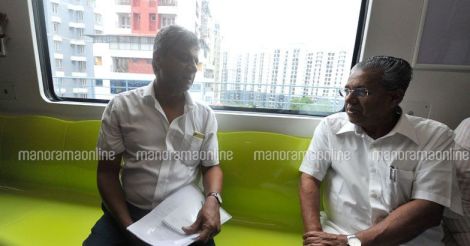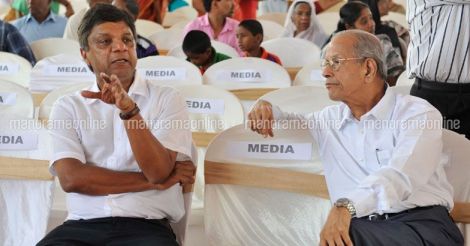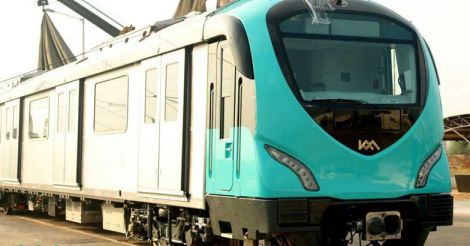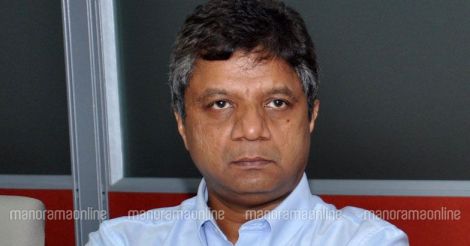Kochi: Back in 2012, when Elias George, a 1982 batch IAS officer and additional chief secretary, took charge of Kochi Metro Rail Ltd (KMRL), the project was in the thick of controversy.
The tussle between KMRL and the Delhi Metro Rail Corporation (DMRC) was looming large and there was uncertainty over whether the project will ever take off.
Check out our Kochi Metro special site
But fighting all the odds, DMRC made Kochi Metro a reality. While all this may sound familiar to most Keralites, not many people know that the person who played a pivotal role in settling the differences between KMRL and DMRC was George. In a conversation with Onmanorama, George talks about Kerala’s most ambitious project.
What are your expectations on Kochi Metro? What all changes do you think it will bring to Kochi?
Metro rail changes a city's traffic system entirely. That's why cities opt for it. Twenty cities in the country are in the queue for metro rail.
One major problem faced by Indian cities is that people prefer traveling in their own vehicles. In Europe, people choose public transport such as the metro, buses, etc., over private vehicles. Public transport hasn't developed in India yet. Hence, traffic is more on cars. If you take the example of Kochi, 50 percent of the people travel by buses. But if you take the number of buses, it's just four percent of the total number of vehicles.
 Elias George with chief minister Pinarayi Vijayan.
Elias George with chief minister Pinarayi Vijayan.Metro rail can change that attitude. We are trying to bring in car users and the passengers of vehicles stuck in traffic signals into the public transport system. That needs a lot of arrangements. The metro, the buses and the boats should function as one system. There should be common ticketing and time schedule. Everything has to work in a uniform manner. It should be possible to get a bus’ running schedule on phone. Buses should have improved facilities. It shouldn’t be a public transport vehicle, where a thousand people are packed in. Our expectation is that once Kochi gets a public transport system that is of convenience to the public, people will prefer it to private vehicles.
We're doing many things for that. Metro trains will have free wi-fi. Buses and boats will get it later. Such attractions will make people prefer metro to cars. The Rs 8,000 crore spent on metro can benefit the public only this way.
The attitude of the people should also undergo a sea change. That's another challenge the metro faces. There's no need to talk more on how the metro was built. Everyone talks about it. What is important is that the change has to come, so that the investment in the rail system is worth it.
Apart from a better transport system, don't you think the metro has changed the wrong work culture and thinking that development work is not possible in Kerala and that anything invites a controversy?
Yes, the reason is that the metro has a different culture. Contracts have to be finished swiftly. Contractors are big. All these factors came together. Land had to be acquired from some 500 plus people. Kochiites had a confidence about this project, so no one created a roadblock. Everyone co-operated. Normally people protest when they lose their land in a key location in the city. Yet, except for one or two people, everyone co-operated.
DMRC, which was in charge of the project, has got a special work culture. Everything came together. Metro has some 10-20 stakeholders: district administration, state and union governments, DMRC, Railways… we all pulled together. All hindrances were removed when the expectations of Kochiites were supported by their conviction that metro is a must. This is such a positive support. Normally, all projects invite allegations. It hasn't happened with the metro.
The local MLA complained he wasn't invited to the (solar project) inauguration. It was raised in the state assembly also.
 KMRL chief in a discussion with E. Sreedharan
KMRL chief in a discussion with E. SreedharanThose are minor things. I asked them if that was the only allegation they could bring up in five years.
A public transport system should not be evaluated purely on the basis of profit. But if a Rs 8,000-crore project does not make profit, will it not affect the entry of such major projects in the future? And will it not become a liability for the government?
Only six or seven of the world's metro services make a profit. And these are in the East, where the rush is high. Hong Kong Metro is profitable, but they construct buildings with multiple floors and let them out. Those are alternative sources of income. But metros are not looking at profit and loss. It increases economic vibrancy in cities. Investments flow in, tourism gets a fillip. People's lives become more secure. Women and children will have better traveling facilities. We are molding safe nights for women. Once the metro is available, they can go to a movie and return home safely. Their time increases. It is such benefits that attract cities to this rail system. Not only that, metro provides a city with a global standard. Economic returns will be high. There's no need to look at just the financial returns alone.
There is a complaint that the metro charges are high. Do you think people will rely on it if the fare remains high?
I don't think it is relevant. If you compare it with the expense involved in a car journey, metro will still be an attraction for people. That's the expectation. I would suggest people to leave their cars at home for a month at least as an experiment and take the metro.
Do you think the parking facilities at the metro stations are enough?

We feel people will take buses or share taxis for traveling to metro stations. There may not be a need to leave one's own cars at metro stations. We're planning more bus routes. KMRL itself is planning to buy buses under the Kakkanad extension project. When all that is ready, we can provide the full experience of the metro.
What all allied expansion plans are set for the smooth advancement of the metro?
We're planning a number of real estate projects. In Kakkanad itself, a realty project is on the anvil. There are plans for a number of facilities at the metro stations itself.
We're planning click-and-collect also. One can choose from the Internet and we will deliver at the stations. Women going home after work can order household articles and collect them as they alight at the metro stations of their choice. These are a few commercial ideas we have right now.
Linking up crowded areas had been one of the reasons for the success of metro services. The Aluva-Palarivattom route does not reach crowded areas. Isn't there a plan for a service to airport?
Airport is in the metro plan indeed. It will come in the third stage. What is immediately needed is the extension to Thripunithura. We hope to begin the work soon. Kochi city begins in Angamali. The detailed plan proposal is ready for extension to Angamali. But all that can be done only after this job is complete.
What is the lesson drawn from Kochi Metro?
It's quite a big challenge to start a project in Kochi. Initially, I also did not think so. This was the fastest built metro in India. In future, metros may be built even faster. The Kochi Metro has the best coaches, trains and stations. To some extent, it's pure luck.

























 Elias George, KMRL chief
Elias George, KMRL chief


